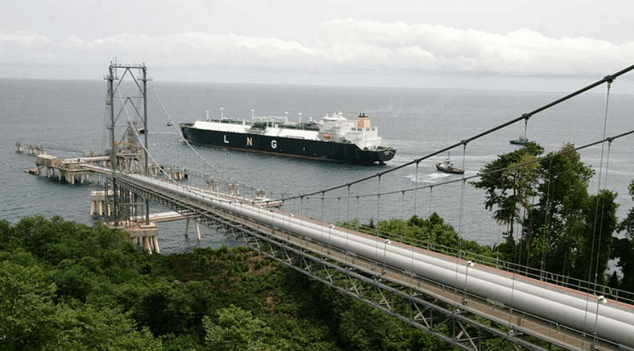LNG is exported from Equatorial Guinea. Image courtesy EG LNG
 By Edward McAllister and Oleg Vukmanovic
By Edward McAllister and Oleg Vukmanovic
NEW YORK/LONDON, July 12 (Reuters) – In signing up to buy all of Equatorial Guinea’s liquefied natural gas for 17 years, Britain’s BG Group unknowingly sealed one of the most lucrative LNG deals ever.
The 2004 contract generates nearly $1 billion a year for BG, and lets it keep almost all profit from gas it sells at five times the price in Asia, according to trading, legal and industry sources who spoke on condition of anonymity.
The deal is perfectly legal, but one which serves as a potent warning to Africa’s other gas-exporter hopefuls such as Tanzania and Mozambique to draw up contracts that safeguard their interests even if circumstances change.
It also underscores the dramatic impact which U.S. shale gas has had in recent years, by lowering U.S. demand for energy imports and opening a lucrative arbitrage in exports to Asia.
“The BG deal is the sexiest contract out there,” said Rudolf Huber, an LNG consultant and contract lawyer based in Vienna. “(But) now oil majors will have to share more of the wealth.”
Exporting countries are becoming increasingly knowledgeable and are pressing for better returns for their resources.
Gas contracts in Russia, Peru and Yemen, for example, come up for renewal in the next few years, and sellers are expected to drive tougher deals that will rein in energy company profits.
BG Group declined to comment on its deal’s commercial aspects, as did the director general at Equatorial Guinea’s state-run gas company, Sonagas.
NO ONE EVER THOUGHT
BG’s contract took effect in 2007 and involves the supply of 3.4 million tonnes of LNG from the tiny African nation every year until 2024.
It allows BG to buy the LNG from Equatorial Guinea LNG (EG LNG), a joint venture led by Houston-based Marathon Oil, at a fixed discount to the U.S. benchmark futures price at Henry Hub in Louisiana, trading sources told Reuters.
Valuing the LNG at about 90 percent of Henry Hub prices made sense at the time of the signing, officials involved said, because all of the gas was intended for the U.S. market where prices were on the rise due to a shortage of supply.
In 2004, U.S. prices were $6 per million British thermal units (mmBtu), and surged to $15 the next year.
But the unforeseen boom in U.S. shale gas since has slashed prices, which now sit below $4, dragging down Equatorial Guinea’s revenues.
Free to decide where it could sell, BG then targeted Asia’s burgeoning economies, where increased demand has pushed prices above $15/mmBtu.
In the first four months of this year, BG sent every Equatorial Guinea cargo to Asia, according to independent consultant Andy Flower.
“No one ever thought the price would diverge enough that you could take Atlantic LNG to the Pacific,” said Howard Thill, vice president of investor relations at Marathon Oil, which holds a 60 percent stake in the Equatorial Guinea export plant.
There is no renegotiation clause in the contract between the EG LNG consortium and BG, Thill said, and no profit sharing when BG sends the gas to non-U.S. buyers.
LOST IN THE WASH
With no cut of the profits, the Equatorial Guinea government was angered to see the gas flowing to markets outside the United States, and pressed for concessions from BG.
“If Equatorial Guinea knew this gas was going to be sent to Asia, it would have been a different negotiation. This was not welcomed by the Equatorial Guinea government,” said NJ Ayuk, managing partner at Centurion in Malabo, a law firm which advises the government on oil and gas contracts.
Tensions flared in 2009 when then deputy energy minister Gabriel Obiang Lima publicly objected to the profits BG made by diverting shipments to other parts of the world.
As a concession, BG privately agreed that the government would receive 12.5 percent of the profit from sending gas to Asia, or about $20 million each quarter, whichever was higher, according to sources with knowledge of the deal. BG also committed to social programmes in the country.
A BG spokesman said these fund local public health schemes including maternal and child health, malaria prevention and sanitation projects.
“It gets lost in the wash,” said Oswald Clint, a senior research analyst at Bernstein Research in London, referring to the modest scale of the concessions.
“Some companies share diversion profits 50-50 with the producer. If BG only has to share 12.5 percent, then it sounds like it has a good deal relative to other contracts.”
The concessions were agreed directly with the government, and do not involve payment to EG LNG, a Marathon Oil spokeswoman said.
What EG LNG did secure in the original deal was a floor price which BG must pay regardless of how low U.S. gas prices fall.
“The floor price guaranteed the economics of the plant and for that protection, we gave BG destination flexibility. There was a give and take,” Marathon’s Thill said.
Last year, BG generated around 40 percent of its $2.6 billion operating profit on LNG from the one deal, even though it accounted for only a quarter of overall volumes, said Clint at Bernstein.
It’s a feat BG is unlikely to repeat under future contracts.
Thill said Marathon, for example, would seek better terms from BG when new gas supplies begin feeding the export plant in around 2020.

 Join The Club
Join The Club











